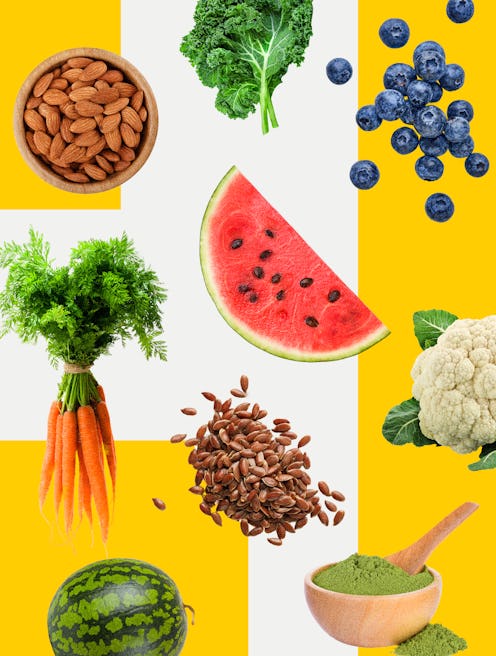(Sun Care)
Experts Say The Mediterranean Diet Could Be Ideal For Optimum Sun Protection
Pass the tomatoes.

One of the biggest weapons in the dermatological arsenal, sunscreen is a crucial step in any skin care routine. Its benefits are both functional and cosmetic. Not only does regular sunscreen application reduce risk for skin cancers such as basal cell carcinoma and melanoma, it also prevents the development of such hallmarks of aging as liver spots, fine lines, and wrinkles, according to the Skin Cancer Foundation. But slathering on the Coppertone isn’t the only way you can stave off sun damage. In what may come as a surprise, your diet also plays a significant role in skin health. Essentially, eating to maintain your youthful glow “comes down to staying well-hydrated … and having a healthy, mostly whole foods- [and] mostly plant-based diet as opposed to trying to drink and supplement your way to health,” Dr. Doris Day, MD, a board-certified dermatologist and a clinical associate professor of dermatology at New York University Langone Medical Center, tells TZR.
Dr. Day’s peer Dr. Rajani Katta, MD, a board-certified dermatologist and a former professor of dermatology at Baylor College of Medicine, breaks down the science behind this claim. Foods that contain antioxidants, substances that include vitamins, minerals, and phytonutrients, can offset the harmful effects of UV radiation by shoring up your skin’s natural defenses, Dr. Katta tells TZR. “[T]he skin is constantly ... exposed to threats, whether that's UV radiation or pollution or the body's own processes, so there are all these intricate systems that are designed to neutralize these threats over the course of a day,” Dr. Katta says. “And one of those systems is that we actually have a lot of antioxidants that are just in our skin’s layers all the time.”
When sun rays strike your skin, they trigger the production of free radicals, highly reactive molecules that possess one or more unpaired electrons. Once they reach a critical mass, free radicals catalyze chemical chain reactions that can cause premature aging and illnesses such as cancer, heart disease, and arthritis, according to a 2010 article published in the peer-reviewed scientific journal Pharmacognosy Reviews. In the process, they also promote inflammation, a systemic immune response that can have similarly negative effects, Dr. Katta says.
Thankfully, antioxidants specialize in preventing free radicals from wreaking cellular havoc. While your body produces the substances naturally, eating foods rich in them replenishes its existing stores. That said, what foods are those? Fruits and vegetables are always a safe bet, Dr. Katta says. They, along with herbs and spices, “are some of the most potent sources of antioxidants,” she says. Take tomatoes, for example. One 2001 study found that people who consumed 40 grams of tomato paste every single day for 10 weeks were more resistant to sunburn at the end than they had been at the beginning, thanks to an increase in blood serum levels of the phytonutrient lycopene. In turmeric, curcumin confers similar benefits; in green tea, catechins; in raspberries, ellagic acid; in red grapes, resveratrol.
So, we should incorporate more of all of the above into our diets. What else? Beyond that, “I really think about … foods rich in vitamin C” such as citrus fruits and red peppers “and foods rich in vitamin E” such as almonds and nuts, Dr. Katta says. For her part, Dr. Day recommends eating produce that is in season.
“So in the fall, we have tomatoes, we have pomegranate, we have squashes. Those are amazing for the skin,” she says. “They're packed with a whole range of antioxidants, from vitamin C to vitamin A and potassium [and] magnesium. All of those elements are important.”
The classic Mediterranean diet will also provide you with all the antioxidants you need, Dr. Day says. So named because it emphasizes ingredients commonly found in traditional regional meals; the diet is heavy on tomatoes, olive oil, fatty fish, nuts, and seeds and light on sugary beverages, refined carbohydrates, saturated fats, and red meats, according to the American Heart Association. Several of the latter have been linked to an increased risk for one or more kinds of cancer.
“[E]ven the occasional glass of red wine has been thrown in there as potentially helpful. That's kind of the most iffy one because I don't know if you really get enough antioxidants from the red wine, but, you know, whatever. Have some fun while you're at it,” Dr. Day says with a laugh.
However, eating foods rich in antioxidants is no substitute for wearing sunscreen every day. Chowing down on raspberries and red peppers can’t immunize your skin to the negative consequences of UV radiation exposure.
“So you can't replace sunscreen with supplements or with foods, but you can enhance the benefits,” Dr. Day says. “[E]ven if you do great sun protection, you're still getting some damage — like, there's just no way to avoid it. But you can help protect against the damage and even reverse some of it with the right supplements and diet.” Getting enough sleep, she says, is also necessary for skin health.
With hot vax summer in full swing, you’ll want to be looking — and, of course, feeling — your absolute best. Vanity is a powerful motive, after all. With that in mind, heed Dr. Day and Dr. Katta’s advice. Make salads. Grill fish. Brew green tea. And in between, don’t forget to apply sunscreen.
Studies and Sources Referenced:
Skin Cancer Foundation. (2019, January 10). Photoaging: What you need to know about the other kind of aging. https://www.skincancer.org/blog/photoaging-what-you-need-to-know/
Skin Cancer Foundation. (Updated 2021, January 13). Skin cancer facts & statistics. https://www.skincancer.org/skin-cancer-information/skin-cancer-facts/#aging
Stahl, W., et al. (2001, May). Dietary tomato paste protects against ultraviolet light–induced erythema in humans. The Journal of Nutrition. https://doi.org/10.1093/jn/131.5.1449
American Heart Association editorial staff. (Reviewed 2020, January 9). What is the Mediterranean diet? American Heart Association. https://www.heart.org/en/healthy-living/healthy-eating/eat-smart/nutrition-basics/mediterranean-diet
Lobo, V., et al. (2010, October). Free radicals, antioxidants and functional foods: Impact on human health. Pharmacognosy Reviews, https://doi.org/10.4103/0973-7847.70902